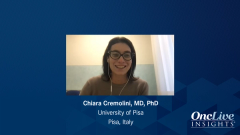
Role of Genomic Testing in mCRC
Experts in gastrointestinal cancers review the role of genomic testing in metastatic colorectal cancer and its impact on informing treatment decisions.
Episodes in this series

Tanios S. Bekaii-Saab, MD: The other thing that also has moved the needle quite a bit in our international practices is the availability of genomic testing. For those patients, especially those who present with later stages, the availability of genomic testing has facilitated decision-making in our part of the world. Almost every patient I see gets a next-generation sequencing [NGS] test either in house at some institutions like ours or working with external entities… I’m curious, in Austria and Italy, are you screening patients for biomarkers routinely? I’m assuming yes, but are you mostly doing it in house? Are you working with commercial entities? How is it working in your countries?
Chiara Cremolini, MD, PhD: The diffusion of NGS is increasing very rapidly. Also, because the management of colorectal cancer and especially of metastatic colorectal cancer requires the knowledge of some molecular markers to properly inform our…choices, we need to know microsatellite instability—not only for metastatic colorectal cancer but also in early stages and especially for the diagnosis of the Lynch syndrome. This is a very important test. We know that KRAS and BRAF are important to determine and to understand which drugs we can use. Also, we have some positive predictors of benefit from some targeted agents. These are options that we cannot deny to our patients.
This is why NGS appears to minimize the cost and the time to have all this information and not to delay our treatment choices waiting for molecular results. This is why NGS is increasingly adopted everywhere. We use an in-house test for our daily clinical practice, which covers the most important genes for the management of colorectal cancer. We do not often use these commercially available tests using the 500 genes because they’re not very important. They may give you some important information, but they’re not totally needed. Having the important information is essential to take our treatment choices and inform our therapeutic route.
Gerald Prager, MD: The situation in Austria is not that much different. What we use, mainly in the big centers, is in-house testing based on a commercially available diagnosis. We have to decide the correct cancer panel based on bigger NGS panels. Most centers, however, might have center-specific varieties. But I agree: it’s standard. Especially the markers, which are in the guidelines. But it’s also cost effective to do more testing within the same panel without extra costs. It’s very much established, at least in the bigger centers in Europe.
Tanios S. Bekaii-Saab, MD: Great. That certainly has revolutionized our treatment strategies in metastatic colorectal cancer.
Transcript Edited for Clarity









































